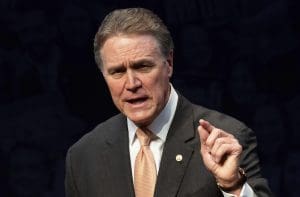GOP senator: Banks profiting off relief funds is 'cost of doing business'
Sen. David Perdue (R-GA) thinks its fine that banks got $10 billion in fees from the fund designed to save small businesses and their employees.

Sen. David Perdue (R-GA) defended a provision in the Coronavirus Aid, Relief, and Economic Security Act that allowed banks to take billions in fees from the fund to save small businesses and protect their employee’s jobs.
Asked about the $10 billion in bank fees in an radio interview this week, he called the system “reasonable.”
“We looked at the fees when we developed the program, with the Secretary of Treasury and the Secretary of Commerce and the president, and others,” Perdue told a local public radio station on Wednesday. “As a business guy, it’s the cost of doing business.”
Perdue called the system “a reasonable structure,” while acknowledging that the banks’ “solvency” and “liquidity” are fully protected by the government.
Perdue was responding to a National Public Radio report that banks had taken about $10 billion in fees from the $349 billion Paycheck Protection Program. That provision of the CARES Act ostensibly provided forgivable loans to small businesses if they agreed to keep their employees on their payroll during the COVID-19 pandemic. The loans are managed by banks, who may charge up to 5% in fees, per Congress.
The bill was written by Senate Majority Leader Mitch McConnell and his Republican caucus, but passed with bipartisan support last month.
The initial Paycheck Protection Program quickly ran out, leaving tens of thousands of small businesses without any aid.
Perdue pushed to add more money to the program. On Tuesday, he voted for another $310 billion in Paycheck Protection Program funds. He said it would “offer a lifeline to small businesses and the millions of hardworking women and men they employ.”
Congress finalized the additional funding on Thursday, and Donald Trump is expected to sign it Friday.
Though he ran as a fiscal conservative promising to reign in the national debt by cutting “wasteful spending and unnecessary bureaucracy,” Perdue backed the 2017 Tax Cut and Jobs Act, which provided billions in tax cuts for big corporations. He also worked to help banks by rolling back the Dodd-Frank regulations enacted to protect consumers from the financial services industry.
“It’s unfortunately no surprise that Senator David Perdue is again taking the side of big banks over Georgia small businesses,” a spokesperson for the Georgia Democrats said in a statement on Thursday. “Instead of holding banks accountable for taking billions in fees from a fund for small business relief, Perdue is content to write off $10 billion in taxpayer money as ‘the cost of doing business’ while Georgia small businesses struggled to get access to needed funds.”
In addition to banks, much of the $349 billion initial Paycheck Protection Program funds went to large corporations. At least $350 million of that money reportedly went to big businesses, rather than small ones.
After public outcry, at least two large companies — the owners of Shake Shack and Ruth’s Chris Steak House — announced this week that they will return the combined $30 million they received.
Published with permission of The American Independent Foundation.
Recommended

Biden campaign launches new ad focused on Affordable Care Act
Former President Trump has said he wants to do away with the popular health care law.
By Kim Lyons, Pennsylvania Capital-Star - May 08, 2024
Ohio doctors fear effects of emergency abortion care case set to go before U.S. Supreme Court
A federal law that allows emergency departments to treat patients without regard to their ability to pay will be under U.S. Supreme Court scrutiny this week, and Ohio doctors are concerned about the case’s local impact on emergency abortion care.
By Susan Tebben, Ohio Capital Journal - April 23, 2024
House GOP votes to end flu, whooping cough vaccine rules for foster and adoptive families
A bill to eliminate flu and whooping cough vaccine requirements for adoptive and foster families caring for babies and medically fragile kids is heading to the governor’s desk.
By Anita Wadhwani, Tennessee Lookout - March 26, 2024














































































